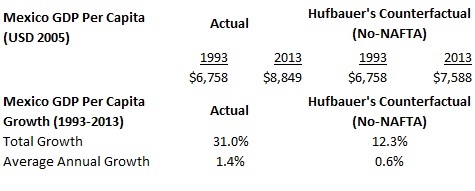NAFTA Advocates Continue to Make Misleading Claims
Published on Friday, July 18, 2014 by Center for Economic and Policy Research
NAFTA Advocates Continue to Make Misleading Claims
by Stephan Lefebvre

[font size=1]
A protestor at Peace Arch Park opposes the U.S.-led Trans Pacific Partnership agreement (TPP), which has been called "NAFTA on steroids."
(Photo: flickr/cc/Caelie_Frampton) [/font]
In an effort to defend NAFTA and promote similar agreements, the Peterson Institute for International Economics (PIIE) – Washington’s most influential think tank on international economic policy – had a full day of events Tuesday. The program highlighted one of their recent publications [pdf], which seeks “not to rehash old claims that may have been overstated but to clear the air so that the benefits and challenges of trade can be examined in an objective light.” In spite of this disclaimer, the authors grossly overstated the benefits of NAFTA for Mexico, and put forward a number of misleading claims, including a particularly egregious bait-and-switch used to justify a rant against the economic policies of the “Andean-3” aka Bolivia, Ecuador and Venezuela. It is a good example of how ideology can trump facts when it comes to commercial agreements made in Washington.
Earlier this year, CEPR published a paper giving an overview of the Mexican economy in the NAFTA era (“Did NAFTA Help Mexico? An Assessment After 20 Years”), so I will focus here on the claims made about Mexico by the PIIE economists. In terms of their bottom line for Mexico, the authors’ findings concur with our conclusions. They say that “Mexican growth in the NAFTA era has been disappointing.” But they also argue that without NAFTA Mexico’s economy would be $170 billion smaller. In other words, they attribute half of Mexico’s (per capita) growth rate to trade in goods and services stimulated by NAFTA (see table below.) Given Mexico’s population (about 118 million), this amounts to a payoff of $1,441 per person, or about $4 per day. In a country where over 27 percent of the population lives on less than $4 a day – in rural areas it is over 48 percent of the population – this would be very significant. In reality, results such as these are produced by economic models that are highly sensitive to parameters which the researchers themselves determine, so it is easy to end up with results that corroborate one’s worldview.

According to Hufbauer’s estimations (above), Mexico’s growth performance – which ranked 18th out of 20 Latin American economies during the past 20 years – would have been less than half its actual abysmal performance without NAFTA. This is a bit tough to swallow. How badly can an economy like Mexico’s perform, when the rest of the region, including the U.S. economy is growing? And if that is the baseline, what does it say about what else is wrong with the Mexican economy? After all, NAFTA was mostly a continuation of policies adopted in the decade prior to the agreement.
The author of these conclusions is Gary Clyde Hufbauer, a name with which anyone who has done research on NAFTA will likely be familiar. For example, in 1993 he wrongly predicted that NAFTA would expand the U.S. trade surplus with Mexico. At the time, he was widely cited in the news media and by those who supported signing the deal. Under NAFTA, the opposite happened as the U.S. surplus turned into a growing deficit. He also said that NAFTA would “lead to long-term growth in Mexican per capita income,” eventually reaching “half of the U.S. level, a gain that substantially would ease illegal immigration to the U.S.” Instead, Mexico’s growth rate slowed, its unemployment level worsened, and immigration soared in the years following NAFTA (until post 9/11 border restrictions and two recessions, including the Great Recession, dampened it).
Certainly NAFTA is not solely to blame for this poor economic performance, but trade liberalization was part of a set of neoliberal economic reforms that on the whole resulted in a dramatic failure. While countries such as Brazil and Venezuela lifted millions out of poverty, Mexico’s stagnant poverty rate and growing population meant an additional 14.3 million people were left below the poverty line in 2012 as compared to 1994, the first year under NAFTA.
More:
http://www.commondreams.org/view/2014/07/18-7
(This work is licensed under a Creative Commons Attribution-Share Alike 3.0 License.)